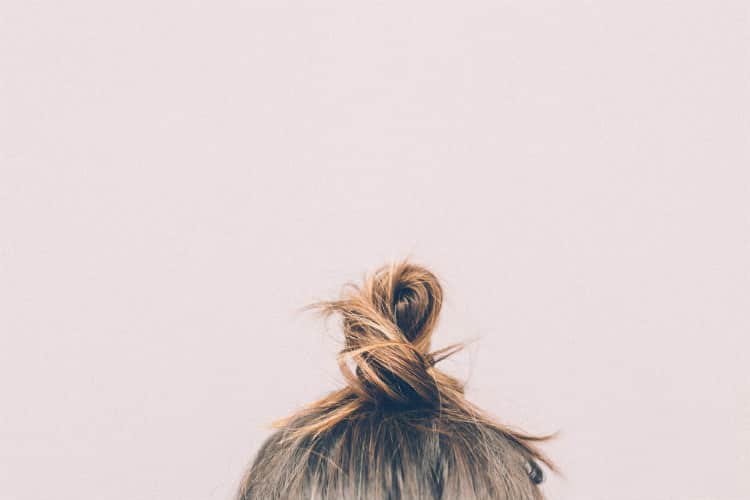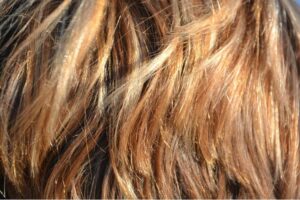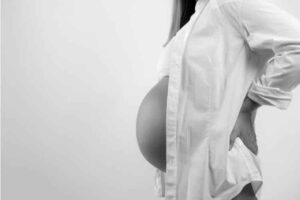If you want to learn more about hair loss, go to Hair loss during pregnancy and after childbirth.
Si vous souhaitez en connaitre plus sur la perte de cheveux, consultez le précédent billet, La perte de cheveux pendant la grossesse et après l’accouchement.
Why do women lose hair during pregnancy and after childbirth? There are many causes of what is known as alopecia.
As women age and approach menopause, they may have increased hair loss, but below are several causes associated with the pregnancy and post-childbirth period.
-
Genetics :
Unfortunately, we are all born with different scalp and hair realities. Our hair is written in our genetic code at birth, and the amount of hair will decline over time. Genetics is always a possible cause at any age. It can become more prevalent during pregnancy or after childbirth.
-
Hormonal Changes :
In general, hair roots are susceptible to hormonal changes, especially to more male hormones (androgen). All women have both male and female hormones.
Significant changes in hormones during pregnancy and after childbirth are associated with hair loss. These modifications can lead to both minor and severe hair loss. Sometimes hair loss is enormous!
During pregnancy, increase metabolism may accelerate the hair growth phase, which disturbs the normal growth and loss process. There usually is 90% growth and 10% loss (about 100 hairs a day) during pregnancy. There is a bit more loss towards the end of pregnancy.
Hormonal rebalancing over time will reduce hair loss.
In the same way, the sudden stoppage of oral contraceptives containing estrogen can lead to temporary hair loss. This is always due to hormonal changes.
-
Thyroid Gland :
The thyroid gland has an influence on several organs in the body. If there is an imbalance, either an insufficiency (hypothyroidism) or overproduction (hyperthyroidism) of the elements required for a balanced body, it will influence hair loss.
However, hair loss will stop once treated by health professionals. Thyroid gland stabilisation will lead to increased hair growth.
-
Medication Side Effects :
Some pregnant or new mothers will take medications for various problems:
- Chronic issues, such as diabetes or intestinal disorders;
- Immune system disorders;
- Depression;
- Skin disorders such as eczema or psoriasis.
Some medication side effects can cause hair loss. This can be seen following major surgery and general anesthesia.
If you note significant hair loss during your pregnancy or after childbirth, ask your doctor or pharmacist if your medications are causing it. It doesn’t mean that you will stop taking the medication, but they may look for alternatives to help reduce hair loss.
-
Lack of Sleep :
Lack of sleep may be a cause of severe hair loss. It can affect the whole body. A decline in energy resources can affect some parts of the body more than others. Make sure you are getting adequate sleep!
-
Stress :
Stress can also lead to hair loss. There are many stressors during pregnancy and after childbirth. The unknowns surrounding this period significantly increases stress. It’s not easy to learn to deal with these new stresses, and the body can react in its own way, losing hair.
Childbirth is a significant stressor for the human body. The days and weeks following childbirth force the body to recover from this adventure. Physical stress caused by pregnancy and childbirth leads to physiological modifications.
Add fatigue, lack of appetite and hormonal changes to stress, and you get the perfect storm to explain severe hair loss during the postnatal period. Hair cycles will come back to normal over time, but this may take up to 15 months after childbirth!
-
Iron, Zinc and Silica Deficiencies :
To properly grow, hair needs to be well fed. A balanced diet during pregnancy and after childbirth can make a significant difference in capillary health and hair loss. Many new mothers will continue taking vitamin supplements after birth. This is a good idea if you note considerable hair loss.
Anemia, which is an iron deficiency, frequently occurs in pregnant or new mothers. You need to solve the problem to stop hair loss associated with it.
To get your daily zinc levels, you can eat pumpkin seeds, oysters, organic eggs, brazil nuts and pecans.
Silica helps regenerate the body. To get enough silica, you can eat cucumbers, mangos, green vegetables (asparagus, celery) and strawberries.
Don’t forget legumes and beans for their potassium and magnesium content. This can positively influence your nutritional balance and hair growth.
-
Crash Diets :
People who go on crash diets may note sudden hair loss due to a lack of calories ingested compared to what the body needs. Anorexia, crash diets or poor diets (due to a desire to rapidly lose weight after pregnancy) can lead to hair loss during the postnatal period.
New mothers need a balanced diet with sufficient food to recover after the challenges of pregnancy and childbirth. The only way to recover physically and emotionally after this period is good lifestyle habits which include a proper diet.
-
Physical and Affective/Emotional Shocks :
Sudden, abundant and short-term hair loss, called telogen effluvium, often occurs during pregnancy. It’s an acute situation, a reaction to physical or emotional shocks and significant changes.
When the body is faced with important physical or emotional demands, it will modify the hair’s lifecycle, leading to more hair loss. This can be after a severe fever, significant weight loss, surgery, accident, childbirth, or following an emotional shock caused by a death or divorce.
Pregnancy and becoming a mother increases both physical and emotional demands on mothers. This experience can lead to more significant hair loss in the weeks and months after childbirth. But the process is reversible because other follicles will grow at the same time.
Hair loss can occur immediately after childbirth, but also within 2-4 months postnatal. In this case, hair loss will principally be on the scalp and last for about 3-4 months. But this can be for up to 1 year for some.
To get advice on how to prevent or limit hair loss, read Advice to Prevent or Minimise Hair Loss.
Pour obtenir des conseils pour limiter la perte de cheveux, voir le prochain billet à ce sujet, Des conseils de prévention pour minimiser la perte des cheveux.




